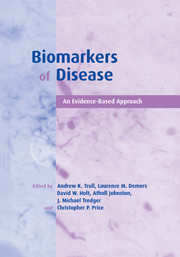Book contents
- Frontmatter
- Contents
- List of contributors
- Preface
- Part 1 Assessing and utilizing the diagnostic or prognostic power of biomarkers
- Part 2 Biomarkers of kidney disease and dysfunction
- Part 3 Biomarkers of bone disease and dysfunction
- 9 Bone turnover markers in clinical practice
- 10 Biomarkers of bone formation
- 11 Biochemical markers of bone resorption
- 12 The clinical application of biomarkers in osteoporosis
- 13 Sources of preanalytical variability in the measurement of biochemical markers of bone turnover
- 14 Genetic approaches to the study of complex diseases: osteoporosis
- Part 4 Biomarkers of liver disease and dysfunction
- Part 5 Biomarkers of gastrointestinal disease and dysfunction
- Part 6 Biomarkers in toxicology
- Part 7 Biomarkers of cardiovascular disease and dysfunction
- Part 8 Biomarkers of neurological disease and dysfunction
- Part 9 Biomarkers in transplantation
- Index
13 - Sources of preanalytical variability in the measurement of biochemical markers of bone turnover
Published online by Cambridge University Press: 20 August 2009
- Frontmatter
- Contents
- List of contributors
- Preface
- Part 1 Assessing and utilizing the diagnostic or prognostic power of biomarkers
- Part 2 Biomarkers of kidney disease and dysfunction
- Part 3 Biomarkers of bone disease and dysfunction
- 9 Bone turnover markers in clinical practice
- 10 Biomarkers of bone formation
- 11 Biochemical markers of bone resorption
- 12 The clinical application of biomarkers in osteoporosis
- 13 Sources of preanalytical variability in the measurement of biochemical markers of bone turnover
- 14 Genetic approaches to the study of complex diseases: osteoporosis
- Part 4 Biomarkers of liver disease and dysfunction
- Part 5 Biomarkers of gastrointestinal disease and dysfunction
- Part 6 Biomarkers in toxicology
- Part 7 Biomarkers of cardiovascular disease and dysfunction
- Part 8 Biomarkers of neurological disease and dysfunction
- Part 9 Biomarkers in transplantation
- Index
Summary
Nonspecific variability in the measurement of chemical analytes is a major issue in clinical chemistry. Consideration and, wherever possible, control of factors not related to the specific process in question are essential for the correct interpretation of laboratory results. At present, these caveats seem to be of particular relevance for the various molecular markers of bone turnover, as the degree of variability of some of these analytes has been shown to be rather substantial.
In general, sources of variability include preanalytical and analytical influences. Total variability (CVT) is therefore defined as the sum of preanalytical (CVPA) and analytical (CVA) variability and may be calculated as CVT2 = CVPA2 + CVA2. Among the preanalytical factors affecting biochemical measurements are, firstly, preanalytical issues such as dietary influences, the type of specimen collected and the mode of sample processing and storage. Secondly, there are biological effects such as age, growth, gender, diurnal variation and other physiological or pathological influences. Finally, factors related to the clearance and metabolism of the marker component (e.g. renal or hepatic function) are considered to be biological variables.
The term ‘analytical variability’ mainly concerns issues of assay performance, i.e. measures of assay precision and accuracy (e.g. linearity, intra-assay and inter-assay variability, quality control and standardization). Recent studies have shown that results obtained from most bone marker assays (including commercial ones) vary greatly between laboratories, either due to the lack of appropriate standards or to suboptimal assay performance.
Information
- Type
- Chapter
- Information
- Biomarkers of DiseaseAn Evidence-Based Approach, pp. 140 - 158Publisher: Cambridge University PressPrint publication year: 2002
